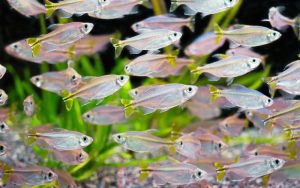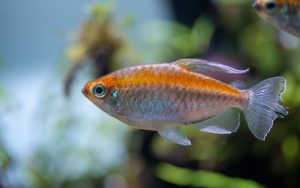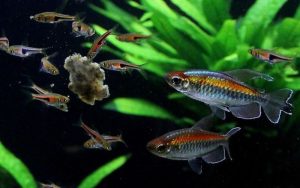Are you a proud guppy owner looking to maintain a clean and balanced aquarium ecosystem? If so, you may have wondered, “Do guppies eat algae?” It’s a valid question, as algae growth can commonly occur in fish tanks, impacting water quality and aesthetics.
This enlightening blog post will explore the intriguing relationship between guppies and algae, uncovering whether these vibrant fish can become the champions of algae control in your aquarium.
Algae, with its greenish hues, can be both a nuisance and a natural component of aquatic ecosystems.
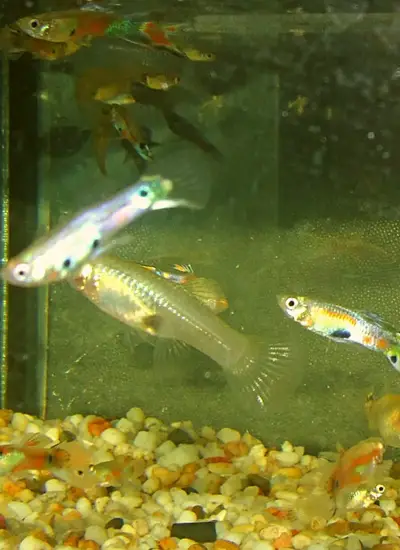
While some fish species are known to feast on algae, it’s essential to understand if guppies also possess this remarkable ability.
By unraveling this mystery, we can learn how guppies maintain a clean and healthy environment for themselves and other tank inhabitants.
So, if you’re curious to know if guppies have an appetite for algae and how this can impact the overall balance of your aquarium, join us on this informative journey.
Get ready to uncover the truth behind the question, “Will guppies eat algae?” and discover the fascinating dynamics of this relationship within the aquatic world.
Table of Contents
ToggleDo Guppies Eat Algae?
Do guppy fish eat algae? Yes, guppies do eat algae. They are known to consume various types of algae, which can contribute to controlling their growth in your aquarium.
However, it is essential to note that while guppies can help manage algae to a certain extent, they may not eliminate it from your tank. This is because they cannot consume algae fast enough, and their size limits the amount they can consume.
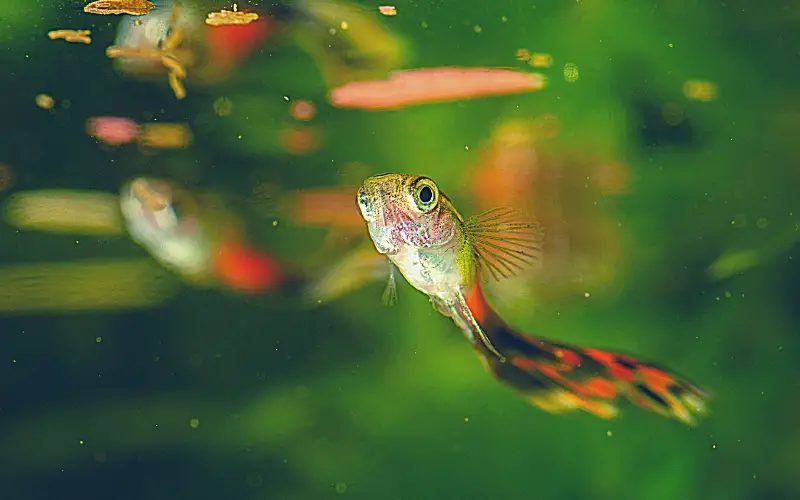
Therefore, if your tank has a significant algae breakout, you may need more than just guppies to control it.
Other methods, such as maintaining proper water conditions, reducing excess nutrients, and utilizing algae-eating species like snails or plecos, may be necessary for effective algae control in your aquarium.
Guppy Diet: Omnivores at Heart
In their natural habitat, guppies are omnivores, meaning they consume a diverse diet comprising animal and plant matter. Their omnivorous nature plays a crucial role in maintaining a balanced ecosystem, contributing to the health of their surroundings.
Primary Diet of Guppies
Guppies feed on tiny aquatic insects, insect larvae, crustaceans, and zooplankton in the wild. Their diet consists of protein-rich sources that aid their growth and vibrant coloration. This natural diet helps them develop the necessary energy to thrive in their environment.
Guppies and Algae: A Symbiotic Relationship
Now comes the intriguing question – do guppies eat algae? While guppies are omnivores but tend to nibble on algae under specific circumstances. Guppies may graze on the algae as a supplementary food source in aquariums or bodies of water with abundant algae growth.
Factors Influencing Guppy-Algae Interaction
Several factors come into play when guppies consume algae:
– Availability of Other Food Sources
When guppies have access to their primary diet of small insects and zooplankton, their inclination to consume algae reduces. Algae may only serve as a supplementary food option when their preferred food sources are scarce.
– Algae Type and Growth
The type of algae present in the environment can also influence guppy behavior. Guppies prefer soft and easily digestible algae varieties over tough and stringy ones.
– Aquarium Conditions
In an aquarium setting, guppies might nibble on the algae grow on surfaces like rocks and decorations. This grazing behavior can naturally respond to their environment, especially if the algae are within reach.
Importance of Algae in Guppy Tanks
While guppies may consume algae occasionally, having some algae growth in an aquarium can be beneficial. Algae serve as a natural food source for microorganisms, which become essential nutrition for small aquatic creatures in the tank. Additionally, algae play a role in maintaining water quality by absorbing excess nutrients.
How to Promote Healthy Algae Consumption for Guppies?
To encourage healthy algae consumption in guppies, consider the following steps:
– Balanced Diet
Ensure that your guppies are receiving a well-balanced diet of high-quality fish food and protein-rich sources. This will reduce their dependence on algae as a primary food source.
– Algae Growth Management
Control the algae growth in your aquarium to prevent it from becoming the sole food option for your guppies. Regular tank maintenance and algae blanket weed removal will help maintain a healthy balance.
What Type of Algae do Guppies Eat?
Guppies are omnivorous fish and will eat a variety of foods, including different types of algae. Some common types of algae that guppies may eat include hair algae, black beard algae, blue-green algae, brown algae, and staghorn algae.
Hair algae can be a nuisance in a fish tank, but guppies may eat it as part of their diet. Black beard algae and staghorn algae are usually not preferred by guppies, and they may require an algae-eating fish or algae-eating shrimp to control their growth.
Blue-green algae, or cyanobacteria, can harm guppies and other fish if it overgrows in the tank. Brown algae, also known as diatoms, are not usually harmful to guppies and may be consumed as part of their diet.
Algae wafers are typically used as a supplement to provide a balanced diet for guppies, and they are made to meet the nutritional needs of algae-eating fish. However, not all guppies will eat algae wafers, and observing their behavior and adjusting their diet is essential.
Is Algae Healthy for Guppies?
Guppies are small, colorful freshwater fish that are commonly kept as pets. When it comes to their dietary needs, guppies need a well-balanced diet that includes a variety of foods.
While commercial fish flakes or pellets are the usual choices for feeding guppies, providing them with natural food sources is also beneficial. Blue-green algae can be an excellent addition to their diet. Algae are rich in essential nutrients, vitamins, and minerals that help maintain the overall health of guppies.
Moreover, guppies are natural grazers, and they would eat algae as a primary food source in their natural habitat. Including algae in their diet can mimic their natural feeding behavior and provide various nutrients.
However, it is vital to ensure the algae is safe and free from harmful toxins before offering it to the guppies. Overall, incorporating blue-green algae as part of a balanced diet can contribute to guppies’ overall health and well-being. Algae can be a healthy food source for guppies.
What Other Foods Do Guppies Need To Eat?
Guppies need a diverse diet to ensure their overall health and well-being. While they can eat algae, more than relying on this food source is required. Guppies need to eat a variety of foods to meet their nutritional requirements.
One of the main options is brine shrimp, an excellent protein source. It can be purchased freeze-dried or live; the guppies will eagerly devour it.
Additionally, it is recommended to give your guppies a high-quality tropical fish formula. This formula is specially prepared to meet the nutritional needs of tropical fish, including guppies.
It contains minerals, vitamins, and other essential nutrients to support their growth and vitality. A balanced diet will ensure your guppies thrive and exhibit brilliant colors and active behavior.
Can Guppies Control Algae Growth?
Guppies, known for their vibrant colors and small size, can be a great addition to any aquarium. Apart from being visually appealing, these little fish can also play a role in controlling aquarium algae. Guppies are considered “algae eaters” because they eat different algae that may grow in your tank.
They have a voracious appetite for algae, including green hair, brown algae, and even black beard algae. However, it is essential to remember that guppies will not eliminate all the algae in your tank.
They can help keep the algae growth under control, but a balance must be maintained. Therefore, it is still essential to regularly clean the tank, provide adequate lighting, and ensure proper water parameters to prevent excessive algae growth.
Nonetheless, if you are looking for a natural and visually appealing way to minimize algae in your aquarium, adding guppies to your tank can be beneficial.
Does Excessive Algae Growth Affect Guppies?
Excessive algae growth can affect guppies in several ways. While algae can benefit a fish tank, such as serving as a natural food source and a natural filtration system, too much algae can cause problems.
When there is excessive algae growth, it can deplete the oxygen supply in the water, leading to a decrease in water quality. This can harm guppies, as they require clean water with adequate oxygen levels to thrive.
Additionally, excessive algae growth can create an unbalanced ecosystem in the fish tank. Algae can compete with other live plants for nutrients, leading to decreased plant growth and a shortage of food sources for guppies.
Furthermore, if the algae growth becomes too thick, it can create a breeding ground for hazardous bacteria and parasites that can affect the health of guppies.
In summary, while there are benefits to having some algae in your fish tank as a food source and a natural filtration system, algae growth should be monitored and controlled to ensure a healthy environment for guppy fish tanks.
What Else Do Guppies Eat?
Guppies are known for their preferences for a variety of food sources. While they are often fed with flakes, pellets, and freeze-dried foods specifically made for them, guppies may also eat other types of food.
They have a natural inclination to consume small insects and larvae that they find in their habitat. Guppies may eat small worms in a fish tank, such as bloodworms or brine shrimp.
Additionally, they can eat vegetable matter, such as lettuce or spinach, and even small pieces of fruit, like crushed peas or finely chopped cucumber. It is significant to ensure a balanced diet for guppies by providing a combination of commercial foods and natural sources of nutrition. By diversifying their diet, guppies can thrive and maintain good health.
Are Aquarium Algae Good For Guppies?
Aquarium algae can benefit guppies as they serve as natural food for them. Guppies are omnivorous fish, meaning they can consume plant material and tiny organisms. Algae provide a nutritious and easily accessible food option for guppies in an aquarium.
Furthermore, some types of algae, such as green algae and diatoms, contain essential nutrients like proteins, carbohydrates, and vitamins that are vital for the overall health of guppies. Consuming algae can enhance their immune system, coloration, and reproduction.
However, it is essential to maintain a balanced growth of algae in the aquarium to prevent excessive growth and maintain suitable water conditions for the overall well-being of the guppies. In conclusion, having aquarium algae can be advantageous for guppies as it fulfills their dietary requirements and contributes to their overall vitality.
Commonly Asked Questions (FAQs)
Do guppies eat algae?
Do guppies eat brown algae? Yes, guppies do eat algae. They are known to be good at controlling algae growth in aquariums.
Can guppies survive on algae alone?
While guppies can eat algae, they cannot rely solely on it for their nutrition. They need a balanced diet that includes other types of food as well.
What types of aquarium algae do guppies eat?
Guppies can eat various types of aquarium algae, including green water algae, fuzz algae, brown algae, and even blue-green algae.
How do guppies help control algae growth?
Guppies feed on algae, which helps control the tank’s excess algae growth. They can be beneficial in maintaining a balanced ecosystem.
Can guppies eat algae wafers?
While guppies can eat algae wafers, they should rely on more than just them as their primary food source. It’s essential to provide a varied diet for their overall health.
How does excess algae growth affect guppies?
The excess algae growth can negatively impact guppies. It might reduce the oxygen levels in the water and create an unbalanced environment, which can harm the fish.
How can I get rid of algae in my fish tank?
Several methods exist to control algae in an aquarium, including regular water changes, reducing lighting duration, maintaining proper filtration, and introducing algae-eating fish like guppies.
Do guppies eat blue-green algae?
Yes, guppies can eat blue-green algae. They are known to effectively control the growth of this type of algae in aquariums.
What should I feed my guppies besides algae?
In addition to algae, you should feed your guppies a balanced diet, including high-quality fish pellets flakes, and occasional live or frozen foods such as brine shrimp or bloodworms.
How can guppies help control the growth of algae in my tank?
Guppies are natural algae eaters and can help control algae growth in your tank. Introducing a few guppies can create a natural balance and reduce excess algae levels.
Final Thoughts
So, do guppies eat algae? In conclusion, while guppies are omnivores and may occasionally nibble on algae, their primary diet comprises small insects and zooplankton. Maintaining a balanced diet and controlling algae growth in the aquarium will promote these vibrant freshwater fish’s overall health and well-being. We hope this comprehensive guide has provided valuable insights into the intriguing question of whether guppies eat algae. Following the suggestions outlined here, you can ensure the best care for your guppies and create a thriving aquatic environment.
You might also like
- Will Guppies Eat Shrimp: Discover the Surprising Harmony!
- What Do Guppies Like in Their Tank: 7 Things Guppies LOVE
- How Long Can Guppies Go Without Food: (Solved & Explained)
- How Many Guppies in a 20 Gallon Tank? (Must-Read)
- Can Guppies Eat Betta Food: Why Not & (5 Best Alternatives)
- How Often Do You Feed Guppies: 9 Tips to Keep Guppy Healthy
- Outdoor Guppy Pond: A Comprehensive Beginner’s Guide!
- What Do Guppy Fish Eat in the Wild: (A Comprehensive Guide)
- Do Guppies Eat Bloodworms: The Shocking Truth! (Revealed)
- Do Guppies Eat Small Snails: Amazing Friendship or Deadly Feud?
- Fish That Eat Algae in Koi Ponds: 10 Miracle Cleaners Revealed!


